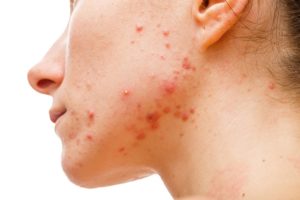
Psoriasis is a chronic disease that can cause those who suffer from it, extreme discomfort when left untreated. Depending on the type and severity of the case, your treatment options can vary.
Psoriasis is a chronic disease that can cause those who suffer from it, extreme discomfort when left untreated. The usual symptoms include dry, patches of skin that can be itchy and painful. While the cause is not fully understood, the condition causes a rapid turnover of skin cells in a way that creates a build-up of dry, dead skin cells. Depending on the type and severity of the case, your treatment options can vary. Usually, a treatment plan can be developed by your dermatologist with a physical examination, but in some cases, a skin biopsy may be required.
When it comes to treatment, there are a variety of options for treatment including topical medications light therapy, oral medications, and injectable medications. Each method has its own benefits depending on the severity of your psoriasis, and there is significant variability in the effectiveness of each patient. For today’s post, we’ll be discussing the various types of topical treatments. In general, topical treatments are best for moderate and mild cases or when used in combination with other treatment types.
Topical Corticosteroids
One of the most frequently used treatments is topical corticosteroids, these are usually prescribed in the form of ointments or creams and reduce itching and inflammation. Less potent strengths are best for sensitive areas of the body. While it is overall very safe to use topical corticosteroids, there can be side effects when they are used for too long or too frequently on certain areas of the skin. Always discuss the usage of these medications with your dermatologist before beginning use
Synthetic Vitamin D
This prescription ointment or cream is used to slow the growth of skin cells, which can help reduce psoriasis effectively. Synthetic Vitamin D is often safer to use in sensitive areas long term as it does not have some of the side effects of topical corticosteroids. It can be used alone or in combination with topical corticosteroids as well.
Synthetic Vitamin D is often safer to use in sensitive areas long term as it does not have some of the side effects of topical corticosteroids. It can be used alone or in combination with topical corticosteroids as well.
Salicylic Acid
This type of treatment is convenient because it is available as an over-the-counter option that can be combined with other methods for more effective use. Salicylic acid works by causing dead skin cells to be sloughed, and it helps to reduce scaling. It is most often used to treat psoriasis of the scalp.
SCS CAN MEET ALL OF YOUR GENERAL AND COSMETIC DERMATOLOGY NEEDS
Skin Care Specialty Physicians has been serving the residents of the greater Baltimore area for over ten years. From skin cancer screenings to treatments for hair loss, eczema, acne, and more, we treat conditions affecting your skin, hair, and nails. We diagnose a wide range of skin conditions each day and work with you to select treatment options that best fit you and your skin. We also offer a variety of cosmetic treatments and procedures, ranging from Botox to microneedling, to fit you and your aesthetic goals. If you are interested in any of our services, contact us at 410.252.9090. You can also follow SCS Physicians on Facebook & Twitter.
